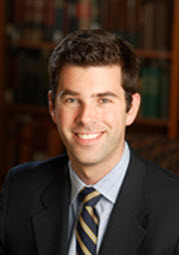SC CTSI KL2 Alum Receives NIH Outstanding New Environmental Scientist Award and Presents at the NIH
William J. Mack, MD, faculty neurosurgeon in the Keck School of Medicine of USC, says the training, support and advice he received from the SC CTSI was crucial to his successful application for his first major NIH RO1 research grant.
Recent decades have been tough on early-career clinical researchers, who have faced particularly stiff competition for major NIH grants. This competition has helped drive the average age of the first grant up into the early 40s, slowing the pace of both scientific and professional progress.
Keck School of Medicine of USC neurosurgeon William J. Mack, MD, says he might have experienced the same career obstacles had it not been for the coursework and mentorship he received as a scholar in the SC CTSI KL2 program.

Support for career development
Mack recently began a research study funded by an Outstanding New Environmental Scientist Award (ONES), a five-year R01 grant from the National Institute of Environmental Health Sciences (NIEHS). The grant has enabled Mack to apply his training in brain science to address complex questions about the effect of air pollution on brain health.
"The award has helped to bring me into a whole new field of research," Mack was quoted as saying at the NIEHS 50th anniversary meeting recently.
Under the ONES grant, Mack will investigate how exposure to the particulate matter in air pollution can interact with blood vessels in the brain to cause cognitive problems, particularly in people with underlying health conditions. Because the study will collect medical data from human participants as well as pollution data from the air in Los Angeles, Mack assembled a cross-disciplinary team that included physicians and biomedical researchers like himself as well as environmental engineering specialists. The engineers developed methods to collect nanoparticle pollutants present in Los Angeles communities.
In May this year, Mack was among current and former recipients of the NIEHS Outstanding New Environmental Scientist (ONES) award who gathered at the NIH to present their research and exchange ideas. Read on.
Strong emphasis on cross-disciplinary team science
"It was the people at SC CTSI that taught me how to assemble a team and collaborate with other scientists to come at a question from different angles," he said. "The thing that's great about my department, USC and the SC CTSI is that there are people far more senior and accomplished than me who are willing to work with me and to mentor me."
Mack – who is associate professor in the Department of Neurological Surgery and director of the Cerebrovascular Laboratory at the Zilkha Neurogenetic Institute, both within the Keck School of Medicine of USC – said the KL2 team and didactic coursework were "instrumental" in launching his research career and getting the RO1 award.
"The SC CTSI helped me both in terms of generating preliminary data and the mentorship I received from my senior colleagues," he said. "There's no doubt this would have been impossible without the funding and support of the SC CTSI."
In fact, added Mack, Jonathan M. Samet, MD, Director, Workforce Development at SC-CTSI and the principal investigator of the Institutional Career Development component of the SC CTSI, is listed as a consultant on the RO1 grant, while other SC CTSI experts provided valuable consulting and advice.
While the federal government raised the NIH 2016 budget, early-career researchers will still face substantial challenges as they seek to win their first major research grants. SC CTSI training and support can make the difference. "I was lucky to get the ONES award before my 40th birthday," said Mack. "An RO1 grant goes a long way toward legitimizing you as a sustainable principal investigator, and that's important for anyone on the research career pathway."



